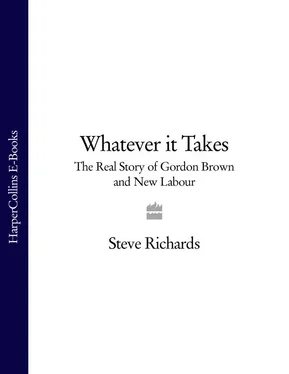Hungry for power almost as an end in itself, Cameron and Osborne rushed out a new offer in response to Labour’s moves, a referendum on the Alternative Vote. This was the same as Labour was offering in relation to electoral reform, although Labour was committed to campaigning for the change whereas the Conservatives were opposed. The duo had spent the last four years seeking a route to power, changing economic policy on the basis of the latest focus-group findings and proclaiming their party’s modernization without changing many of the assumptions and polices that they had inherited. Cameron and Osborne opposed voting reform, but their desire for power meant they did not hesitate to make the offer.
Their move was decisive. When Clegg got the news, a few minutes before it was released to the media, his mind was more or less made up. He wanted to do a deal with the Conservatives and take part in a formal coalition. He had never had much doubt. Later Clegg was hailed for his ruthless negotiating techniques, but he did not have to try very hard. Both sides were desperate for a deal and at times he had been genuinely torn, not least because Ashdown had moved some distance over the weekend towards Labour, and his other former leaders – Charles Kennedy and David Steel – had always been keener on a deal with Labour.
But Clegg was reaching a firm decision on Monday evening and acquired ammunition from former cabinet ministers David Blunkett and John Reid who led the charge against a Lib/Lab coalition. Reid spoke out passionately against an arrangement. In fact Labour was not proposing a formal arrangement with the SNP, only with the Lib Dems, but Reid was not one to allow details to intervene. Blunkett was far more perceptive and his opposition carried more weight. The left of the Labour party started to speak out as well. On the other side Cameron faced similar problems with the right of his party, but Clegg had found his soulmate, two pragmatic leaders bound by their hostility towards the state and their capacity for polite, almost apolitical negotiations.
The dynamics revealed much about Labour’s diminished hunger for power. Reid and Blunkett had been cabinet ministers. Straw had served in the cabinet from 1997 to the very end. If they had been eager for their first ministerial posts their reaction to the result might have been very different. Sated personal ambition played a part in the cries within Labour against a Lib/Lab coalition.
On the Tuesday morning Brown and Clegg had one further meeting, but Labour’s negotiating team sensed they were being played along. The Lib Dems had briefed misleadingly that Labour’s team had been aggressive in the negotiations, especially Ed Balls. Adonis, no natural ally of Balls, was adamant that Balls behaved politely throughout. Labour’s team sensed trouble, assuming the briefing was aimed at showing Ashdown and others that they had tried but faced immovable objects. Brown, who had been in some ways the most enthusiastic for a coalition, moved from high hope on Monday night to pessimism by Tuesday morning. Still he clung to a shred of optimism. At midday, hours before his resignation, he had a phone call with Sir Ming Campbell, spelling out in detail how the mechanisms were in place for a Lib/Lab coalition and how he had prepared for the appointment of Lib Dems in senior departments.
During a phone call with Brown early in the afternoon Clegg was evasive. ‘Look, I’m not in a position to give you a definitive answer,’ he told Brown. ‘I want to continue to speak to both sides. Coalition talks take a long time in other countries. There’s nothing unusual about this. Why the hurry?’
Brown responded: ‘The country will not understand if this ambiguity continues. The public needs certainty and we must provide an answer.’ He issued one last plea to Clegg: ‘I am convinced this is the right time to create a Progressive Alliance. I know the electoral arithmetic is difficult but I think there is a way round that.’
Clegg fudged again: ‘I still want to go on talking to both sides.’
Brown struggled to hide his frustration as he replied: ‘I have to go the Palace soon. If you are not prepared to commit yourself you have to tell me. Now.’
Clegg: ‘I will call you back in five minutes after I’ve talked to my advisers.’
After Brown put the phone down, he discussed his next move with Mandelson, Campbell, and old cabinet allies Ed Balls, Ed Miliband and Douglas Alexander. They knew it was over. One observer noted: ‘We all agreed it could not go on any longer. It was obvious Clegg wasn’t serious about doing a deal. He was using it so he could go back to Cameron and get more out of him. We didn’t have the numbers and the Labour Party just wouldn’t wear it.’
Brown had made one big mistake in the four days. He had failed to summon Labour MPs for an early meeting in order to keep them fully informed. As a result they felt excluded and ignorant and began to express public wariness to a deal. Seen widely as a Labour tribalist, Brown had given little thought to the tribe as he planned a realignment on the centre left more dramatic than any plan contemplated by Tony Blair. By Tuesday mid-afternoon Brown knew that there would be no deal: he would be out of power within hours.
After three years of erratic, frail authority he decided to seize full control of his departure, with the help of Mandelson and Campbell, the great choreographers and manipulators of the New Labour era. As was often the case with the misunderstood duo, they were motivated by humane considerations as they planned a final move. Politicians are human beings, as fearful of public humiliation as anyone else. They had helped ease the way for a small army of ministers. Now the game was over for Brown, for them and for Labour. They wanted to help Brown to leave with dignity. Brown spent much of the day writing letters to friends and colleagues, thanking them for their support, a generous gesture made with no ulterior motive.
Brown also wrote the final version of his farewell speech, including a reference to his own personal failings, although others had encouraged him to part with a hint of humble self-awareness. With Sarah, Mandelson arranged the perfect visual departure in which finally their two sons John and Fraser would join them in the public eye as they left Number Ten for the last time, a humanizing image that had eluded Brown when he sought to cling to power.
In one final phone call Clegg had begged Brown to stay on for a little longer while he resolved what to do. Brown refused at first and then appeared to waver a little. Mandelson grabbed a card and wrote in big bold letters: ‘No More Time!’ He ostentatiously placed the card in front of Brown. There was no more wavering. Brown had also spoken to Blair again on the phone, explaining that he had given up hope of a deal. One way or another they were all there at the end as they had been at the beginning, Blair, Brown, Campbell and Mandelson. For all the mighty rows and fallings-out, they almost needed to be there for those final moments. When Mandelson had resigned from the cabinet for the first time he turned to Brown to help him compose his resignation letter even though Brown and his allies had brought about his downfall. Although Blair had kept Brown out of Number Ten for as long as possible, Brown turned to him for advice in his final days and Blair was happy to offer it.
Brown completed his call to Clegg insisting he had already decided to see the Queen to resign. ‘I can’t go on any longer, Nick, I’m going to the Palace.’
A resigned Clegg replied: ‘If that’s your decision …’ Brown said: ‘It is.’ He called Sarah and his sons John and Fraser to his office, hugged his Downing Street team and walked out of Number Ten with his family for the last time.
Читать дальше












